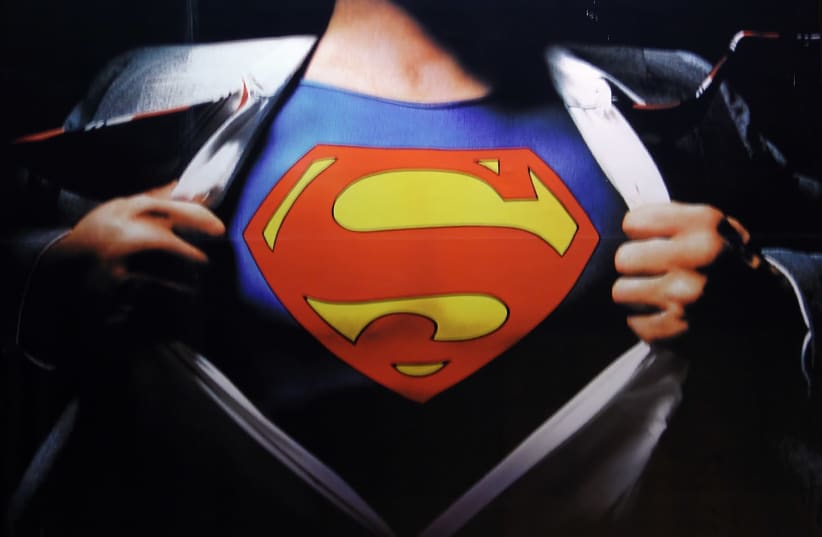There is undoubtedly a powerful Jewish influence on the character, as well as in the comic book industry as a whole.
And while its title may be humorous, Is Superman Circumcised? The Complete Jewish History of the World’s Greatest Hero by Roy Schwartz is nonetheless an in-depth examination of the Jewish roots of the character over the course of his nearly century-long lifespan, and the conclusion this book comes to over the Jewishness of the Last Son of Krypton is a resounding “yes.”
“That’s right. Superman, the Man of Steel, the symbol of Americana, is Jewish,” Schwartz declares in the very beginning of his book, and proceeds to look into the various aspects that lead to this conclusion, taking the reader on a dive through of Jewish theology, culture and history.
On the one hand, part of this Jewish history of Superman is very well-established. Written in 1938 for Action Comics, the character was created by Jerry Siegel and Joe Shuster, the sons of Jewish immigrants to the United States. This alone is not exactly unique, as most of the most famous comic book characters created from the late 1930s through the ‘60s and ‘70s (Batman, Spider-Man, the Fantastic Four, Captain America) were all made by Jewish writers and artists.
But it is more than the simple history and commonalities among the faiths and ethnicities of the creators that lead to the Man of Steel being Jewish. Other themes are at play here, the trends of mysticism and Jewish storytelling that lead to the creation of myths – a pattern that Schwartz points out is more similar to that of American folklore creation compared to European folklore development, which fits Superman’s identity as the defender of the American Way.
And the parallels between Superman and many Jewish heroes are evident. Whether it be his birth name, Kal-El, evoking a distinctly Hebrew root to his story, or powers and adventures baring similarities to the likes of Noah and Moses (last of his kind, cast adrift in a vessel, a symbol of moral righteousness) as well as Samson (super-strength and heroic feats).
THE PARALLELS continue. Like Moses, Superman is raised among foreign people and then receives a vision telling him of his calling and true power (for Moses, the burning bush. For Superman, a hologram of his father, Jor-El). But what is even more noteworthy is Superman’s enemies. As Schwartz argues, Superman defies typical myth-making conventions and, in his early days, did not fight great, mighty monsters of supernatural, inhuman force. His primary enemies at first were criminals and slumlords. His first supervillain foes were mad-scientists like Lex Luthor, and then alien conquerors like Zod and Brainiac. The conclusion Schwartz goes to is that they were symbols of tyranny and oppression, foes that often befall the Jewish people throughout biblical and more modern history.
And this makes sense when examining the circumstances behind his creators. The children of immigrants amid rising antisemitism in Europe alongside Nazi Germany, Siegel and Shuster had plenty of context that bled into the creation of characters. But arguably one of the most poignant themes in Superman’s creation is that of being an “other,” being an outsider in his new home. While some interpretations of the character throughout the decades have leaned into this theme, others have taken other approaches to the character, such as leaning into Jesus-parallels.
But while it is true that there are certain parallels to Jesus in Superman, that does not mitigate the influence of Moses and Samson in the character. In fact, as Schwartz cites, according to former DC Comics president and editor-in-chief Jenette Kahn, DC Comics was always true to the “Moses story” behind the character.
“He is very much like the sage Hillel’s saying, ‘If I am not for myself, who am I? If I am for myself only, who am I? If not now, when?’ That is really the core of Superman.”
All of this is merely a sliver of the deep-dive into arguably the world’s most famous and iconic fictional character and his Jewish influences. And while he may not explicitly be Jewish on the pages of the comic (canonically, Superman was raised a Methodist) and there are other high-profile comic book characters of explicitly Jewish origin (X-Men’s Kitty Pryde, Moon Knight and, technically, Batman), the Jewish roots and context are essential to the character and his portrayals over 80-plus years of serialization.
This book is a must-have for any fan of superheroes, comic books and Jewish history and literature.
